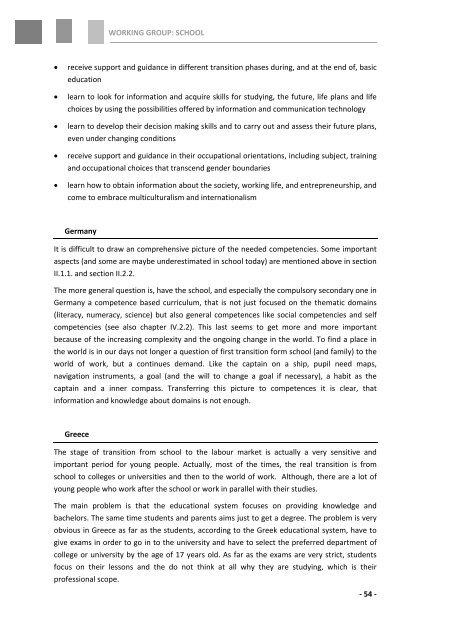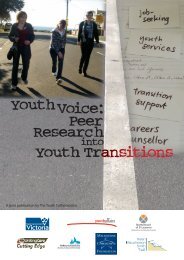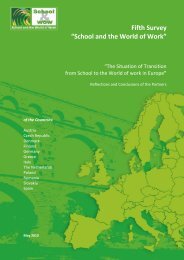Second Survey School and WOW.pdf
Second Survey School and WOW.pdf
Second Survey School and WOW.pdf
Create successful ePaper yourself
Turn your PDF publications into a flip-book with our unique Google optimized e-Paper software.
WORKING GROUP: SCHOOL<br />
<br />
<br />
<br />
<br />
<br />
receive support <strong>and</strong> guidance in different transition phases during, <strong>and</strong> at the end of, basic<br />
education<br />
learn to look for information <strong>and</strong> acquire skills for studying, the future, life plans <strong>and</strong> life<br />
choices by using the possibilities offered by information <strong>and</strong> communication technology<br />
learn to develop their decision making skills <strong>and</strong> to carry out <strong>and</strong> assess their future plans,<br />
even under changing conditions<br />
receive support <strong>and</strong> guidance in their occupational orientations, including subject, training<br />
<strong>and</strong> occupational choices that transcend gender boundaries<br />
learn how to obtain information about the society, working life, <strong>and</strong> entrepreneurship, <strong>and</strong><br />
come to embrace multiculturalism <strong>and</strong> internationalism<br />
Germany<br />
It is difficult to draw an comprehensive picture of the needed competencies. Some important<br />
aspects (<strong>and</strong> some are maybe underestimated in school today) are mentioned above in section<br />
II.1.1. <strong>and</strong> section II.2.2.<br />
The more general question is, have the school, <strong>and</strong> especially the compulsory secondary one in<br />
Germany a competence based curriculum, that is not just focused on the thematic domains<br />
(literacy, numeracy, science) but also general competences like social competencies <strong>and</strong> self<br />
competencies (see also chapter IV.2.2). This last seems to get more <strong>and</strong> more important<br />
because of the increasing complexity <strong>and</strong> the ongoing change in the world. To find a place in<br />
the world is in our days not longer a question of first transition form school (<strong>and</strong> family) to the<br />
world of work, but a continues dem<strong>and</strong>. Like the captain on a ship, pupil need maps,<br />
navigation instruments, a goal (<strong>and</strong> the will to change a goal if necessary), a habit as the<br />
captain <strong>and</strong> a inner compass. Transferring this picture to competences it is clear, that<br />
information <strong>and</strong> knowledge about domains is not enough.<br />
Greece<br />
The stage of transition from school to the labour market is actually a very sensitive <strong>and</strong><br />
important period for young people. Actually, most of the times, the real transition is from<br />
school to colleges or universities <strong>and</strong> then to the world of work. Although, there are a lot of<br />
young people who work after the school or work in parallel with their studies.<br />
The main problem is that the educational system focuses on providing knowledge <strong>and</strong><br />
bachelors. The same time students <strong>and</strong> parents aims just to get a degree. The problem is very<br />
obvious in Greece as far as the students, according to the Greek educational system, have to<br />
give exams in order to go in to the university <strong>and</strong> have to select the preferred department of<br />
college or university by the age of 17 years old. As far as the exams are very strict, students<br />
focus on their lessons <strong>and</strong> the do not think at all why they are studying, which is their<br />
professional scope.<br />
‐ 54 ‐




